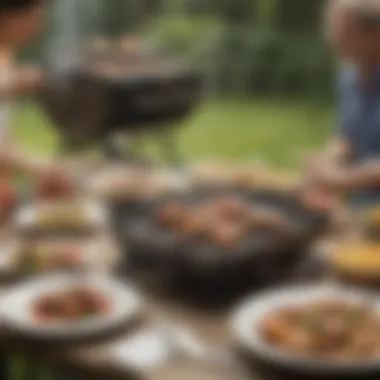Exploring the Benefits of Portable Grills with Cases


Intro
Portable grills have become more than just a trend; they offer versatility and convenience for outdoor cooking enthusiasts. In recent years, the market for portable grills equipped with carrying cases has expanded significantly. Whether you're headed to a tailgate party, a picnic, or a camping trip, these grills come packed with features that make outdoor cooking simpler and more enjoyable. They allow food lovers of all ages to savor delicious meals with ease, contributing to memorable culinary experiences away from home.
The design of these grills often realizes efficiency and usability, tailored for people who want to cook on the go. Manufacturers have begun to create grills that hold up against the elements, while still being easy to transport. Carrying cases, usually ingeniously designed, help in protecting the grill and its components from wear and tear, making them ideal for travel.
Aside from the obvious ability to prepare great food, the proper selection of a portable grill can elevate your experience tremendously. When you consider various characteristics and factors before making your choice, the outcome can be seamlessly enjoyable meals that enhance the outdoor atmosphere.
This article dives into the numerous advantages of using portable grills with carrying cases, examining their practicality, beneficial features, and maintenance tips that ensure their longevity. Let's explore how these handy cooking companions can transform picnics and outdoor gatherings into moments of culinary delight.
Understanding Portable Grills
When it comes to outdoor cooking, portable grills play a significant role. They combine the joy of grilling with the ease of transportation, making them an essential item for numerous culinary enthusiasts. Whether you’re tailgating on game day, embarking on a camping journey, or simply hosting a backyard cookout, portable grills offer versatile solutions tailored for various settings. Understanding what they are and their benefits can guide potential buyers toward making informed decisions and enhancing their grilling experience.
Definition and Purpose
A portable grill is designed to be lightweight and compact, allowing for easy transport and setup. These grills can be powered by gas, charcoal, or electricity, catering to different cooking preferences. Their primary purpose is to enable outdoor cooking without the constraints of a traditional stationary grill. These portable options democratize the art of grilling; you can whip up your favorite barbecue anywhere, from the beach to a picnic in the park.
Many portable grills come with carrying cases that add another layer of convenience. These cases simplify transportation and protect the grill from environmental elements when not in use. Furthermore, the design of carrying cases typically promotes easy storage, making it a breeze to stow away in car trunks or closets when the grilling season wanes.
History of Portable Grills
The concept of portable grills has evolved significantly over the decades. In the early 20th century, outdoor cooking revolved around rudimentary setups, often constructed from scrap materials. Charcoal grills, which emerged during this time, provided the first taste of convenience but still lacked the mobility we recognize today.
By the mid-century, companies began producing dedicated portable grills. Brands like Weber popularized kettle-style charcoal grills, aiming for outdoor cuisine that could be easily transported. The 1970s and 80s saw an expansion of lightweight materials and design innovations, making traveling with grills much more feasible. Moreover, the introduction of propane grills simplified the grilling process, offering a quick-start method without the need for charcoal.
Today, portable grills are more than just cooking tools; they represent a lifestyle choice for many. Grilling has become synonymous with leisure, bonding, and culinary adventures. The blend of design, technology, and functionality in modern portable grills coupled with their carrying cases evokes a movement towards communal outdoor cooking experiences.
It's clear that understanding the history and purpose of portable grills can deepen appreciation for them. They are not just tools but rather a means of bringing people together around food, regardless of location.
Features of a Portable Grill with Carrying Case
When it comes to outdoor cooking, the convenience offered by portable grills with carrying cases cannot be overstated. These grills stand out due to their flexibility and adaptability to different environments, making them essential for camping trips, tailgate parties, and backyard barbecues. A well-designed portable grill doesn’t just cook food; it provides an experience where ease meets performance.
Size and Weight Considerations
In selecting a portable grill, size and weight are key factors to consider. A grill that is too heavy or bulky can become a cumbersome burden when packing for a trip. Conversely, a lightweight model may sacrifice stability or cooking surface area. The ideal portable grill strikes a balance between being compact enough to transport easily and large enough to accommodate cooking needs.
For instance, a grill weighing around 20-30 pounds may offer a generous cooking surface without becoming a hassle to carry. Choices will differ based on the intended use. Therefore, think about how often and where you plan to cook outdoors. A grill that fits snugly into a compact carrying case is often a godsend for enthusiasts who are on the go.
Material and Construction Quality
The durability of a portable grill largely depends on the materials used in its construction. When evaluating portable grills with carrying cases, one cannot overlook the essence of robust material and quality craftsmanship.
Stainless Steel vs. Other Materials
Stainless steel is often viewed as the gold standard in grill materials. It resist rust and corrosion, making it suitable for outdoor use. Unlike aluminum or cheaper metals, stainless steel holds heat effectively, leading to more even cooking. This is especially important when grilling meats that require precise temperature control. Notably, the aesthetic appeal of stainless steel cannot be overlooked, as it often looks sleek and modern.
However, stainless steel grills can be on the pricier side. Alternatives like cast iron or aluminum may seem appealing for budget-conscious buyers, but they come with their own set of limitations, such as vulnerability to rust or uneven heating. Therefore, choosing the right material can significantly impact the grill’s long-term performance and value.


Durability and Weather Resistance
Durability and weather resistance are critical aspects for portable grills. If a grill can withstand various weather conditions, it can be a dependable companion throughout your culinary adventures. Many grills now come equipped with weather-resistant features that are beneficial when you're cooking outdoors.
For instance, grills with coated surfaces or protective covers are designed to endure rain or even snow, preventing rust and wear. These features not only enhance the longevity of the grill but also ensure the safety of your food. However, such built-in protections might increase the initial purchase price, but they often pay off in longevity and reliability.
Ease of Assembly and Portability
Finally, the ease of assembly and portability is paramount for those who want to enjoy grilling without the fuss. Many models today are designed for straightforward setups, allowing even a limited user to get the grill fired up in minutes. Some grills feature snap or click assembly systems, eliminating the need for tools and minimizing hassle.
Moreover, a great portable grill should fold or collapse neatly into its carrying case, ensuring that storage and transport is smooth and hassle-free. A thoughtfully designed carrying case often adds to the user experience, making it even easier to bring your grill to parks, campsites, or the backyard.
"A portable grill isn't just about cooking; it's about creating memories with every meal shared outdoors."
Selecting the Right Portable Grill
When it comes to cooking outdoors, choosing the correct portable grill can make the difference between a pleasant culinary experience and a frustrating one. Many factors play a role in this choice, from the type of food you plan to cook to the venue where you'll be using this grill. With a plethora of options available, understanding your specific requirements is essential.
Analyzing Cooking Needs and Frequency
Before settling on a portable grill, it’s important to evaluate your cooking needs. Are you planning a picnic for two, or a big family gathering? The number of people you’ll be serving will influence the grill size you select. For instance, a compact grill may suffice for a couple hot dogs or burgers, but for a crowd, you might need something larger.
Your frequency of use also comes into play. If you grill several times a week, investing in a robust and durable model will pay off in the long run. Conversely, if you only fire up the grill a few times a year at casual get-togethers, then a lightweight, budget-friendly option could be more practical. A little bit of thought now saves you from making a purchase that doesn’t meet your needs or from having to buy additional equipment later.
Understanding Heat Sources
Regardless of the model you choose, the heat source is a fundamental aspect of every grilling operation. The three common types are charcoal, gas, and electric. Each type has its own unique characteristics that can deeply impact your outdoor cooking experience.
Charcoal Grills
Charcoal grills boast a certain level of charm. They provide that classic smoky flavor that many grilling aficionados crave. One key characteristic of charcoal grills is their ability to reach high temperatures, making them great for searing meat. This can be a particularly enticing quality for those who appreciate that distinct grilled taste. However, there’s a catch: charcoal grills can take longer to heat up and require more time for cleanup.
The unique feature is their adjustable vents, which give you control over airflow and temperature. While they’re often cheaper to purchase upfront, users might find that constant charcoal purchases can add up. In a nutshell, if you enjoy the ritual of grilling and don’t mind a bit of effort, charcoal grills are an appealing choice.
Gas Grills
Gas grills, on the other hand, are known for their convenience and speed. They usually ignite with the push of a button, making them a suitable choice for impromptu grilling, such as when friends invite themselves over last minute. The versatility of gas grills is admirable; you can cook a variety of dishes ranging from burgers to grilled vegetables with the same efficiency.
A key characteristic is the temperature gauge, which helps you monitor heat levels easily. However, while they are user-friendly, a good gas grill tends to be pricier than its charcoal counterpart. Plus, there’s also the aspect of gas refills to keep in mind, although propane tanks are widely available.
Electric Grills
Electric grills often get overlooked but they are steadily gaining traction, particularly in urban settings where space may be at a premium. One major advantage is that they are easy to use and often require little to no assembly. Just plug it in and you’re ready to start grilling.
A notable characteristic of electric grills is their consistent temperature control. If you’re someone who prefers grilling indoors or in restricted environments, an electric grill might be your best option. While they are convenient, electric grills may lack the traditional grilled flavor, a potential downside for purists.
Cost vs. Value Considerations
When contemplating a grill purchase, balancing cost and value is vital. A budget-friendly model might save money upfront but may lack in durability and performance. Consider how much you’re willing to spend and what features are absolutely essential for your grilling lifestyle. A little bit of research can help ensure that you’re not only getting the best deal but also a grill that performs well over time.


Using Portable Grills Effectively
When it comes to portable grills, knowing how to use them effectively can be the difference between a mediocre meal and a culinary delight under the open sky. With these handy devices, you can enjoy delicious grilled dishes just about anywhere, whether it’s at the beach, park, or during a camping trip. Understanding how to prepare, cook, and maintain your portable grill not only enhances performance but also makes your outdoor cooking experience much more enjoyable.
Preparation and Setup
Getting started with a portable grill means having the right setup. Before you even unfold the grill, it’s crucial to choose a suitable location. Find a flat, stable surface, away from flammable materials. This minimizes safety hazards and provides a good base for cooking. Next, arrange your ingredients and utensils nearby before lighting the grill. Having everything at hand helps avoid those frantic runs to the cooler or pantry once you’ve ignited the flames.
Each grill model comes with its own instructions for setup. Some are straightforward, requiring minimal assembly, while others might need a little more effort. Pay attention to the assembly instructions provided by the manufacturer. Once the grill is ready, always check for proper fuel levels if using gas, or ensure your charcoal is ready if that's your heat source.
Cooking Techniques for Portable Grilling
Direct vs. Indirect Heat
The difference between direct and indirect heat is fundamental in grilling. Direct heat involves placing food directly over the heat source. This method excels at producing a crisp exterior and rich flavors, ideal for quick-cooking items like burgers and hot dogs. However, it’s not without its pitfalls; there’s a higher risk of burning if not monitored closely.
On the flip side, indirect heat is a game changer for larger cuts of meat or dishes that require more cooking time. In this method, food is placed away from the heat source, allowing it to cook slowly and evenly. This technique prevents drying out and results in tender, juicy dishes that practically fall apart with a fork. Understanding when to use either method is massively benificial for maximizing the flavor and texture of your grilled foods.
"The right technique can transform a simple meal into a feast worth talking about."
Temperature Control Strategies
Temperature control is crucial while using a portable grill, especially when you're on the move. Being able to adjust the heat allows precise cooking, helping you master everything from searing steaks to gentle vegetable roasting. For gas grills, this usually means turning the knobs to adjust the flame, while charcoal or electric grills require a bit more finesse to regulate heat levels.
A common strategy is to create heat zones within the grill. By placing more coals or raising the flame on one side while keeping the other side cooler, you set yourself up for versatile cooking. You can start cooking something quickly on the high heat side before transferring it to the cooler side to finish cooking without burning.
Safety Precautions During Use
Safety is paramount when grilling outdoors, as the elements can introduce risks. First and foremost, ensure your grill is in good working order. Check for gas leaks in propane grills or ensure charcoal is stored dry and away from moisture. Always have a fire extinguisher or bucket of water or sand close at hand in case of emergencies. This can make a difference between a fun outing and a disaster.
When grilling outdoors, consider wind direction to prevent smoke from blowing in people's faces. Also, never leave a hot grill unattended. Accidents can happen in the blink of an eye. Once you’re done cooking, remember to let the grill cool down before packing it. This not only extends the life of your equipment but also minimizes the risk of burns.
By mastering the art of using portable grills effectively, you elevate the outdoor cooking experience significantly. It’s a blend of good preparation, understanding techniques, and maintaining safety. Ultimately, this knowledge enhances every gathering, transforming meal prep into memorable culinary adventures.
Maintenance and Care for Longevity
Taking care of your portable grill is key to keeping it in tip-top shape. Neglecting maintenance may lead to a shorter lifespan and less enjoyable cooking experiences. Regular upkeep not only prolongs the life of your grill, but it also ensures your food tastes just as good each time. Think of your grill as a trusty companion that deserves a bit of attention.
First off, let’s talk about how maintenance affects performance. Just like a car needs an oil change, your grill requires cleaning and proper care to function efficiently. Baked-on grease and food particles can cause uneven cooking or worse, a completely clogged grill. If you want to impress your friends at the next backyard barbecue or camping trip, maintaining your grill goes a long way. A clean grill means you’re getting the best flavor possible from your ingredients.
Cleaning After Use
Cleaning your grill after each use may feel like a chore, but it's absolutely worth it. Here are some simple steps to make it efficient:
- Let it Cool Down: After you're done grilling, allow the grill to cool a bit but not completely. It’s easier to scrape off food debris when it’s warm.
- Scrape the Grates: Use a grill brush made of brass or stainless steel to scrub the grates. A good brush gets rid of charred food remnants and prevents rusting.
- Wash with Soap: If you are using a grill with removable grates, take them out and wash with mild soap and warm water. Rinse them well and let them dry.
- Wipe Down the Exterior: Don’t forget the outside. A damp cloth helps to wipe off any spills or stains on the grill's surface. If you see rust, attend to it right away to keep corrosion at bay.
- Oil the Grates: After cleaning, lightly oil the grates to promote a non-stick surface for the next cookout. A paper towel soaked in oil works wonders for this step.
"A clean grill is a happy grill. Don’t slack off on maintenance to ensure consistent results!"
Storing Your Portable Grill


How you store your grill can greatly affect its longevity. Here are a few pointers for smart storage:
- Use the Carrying Case: Never underestimate the protective power of a good carrying case. It shields your grill from dust, moisture, and unwanted pests
- Store in a Dry Place: Moisture is a grill’s worst enemy. Storing it in a damp garage or shed can lead to rust and mold. Aim for a dry space with good airflow.
- Keep it Covered: If your grill doesn’t have a case, consider getting a grill cover. Even a simple tarp can do the trick. Ensure it’s breathable to prevent moisture buildup inside.
- Disconnect Fuel Sources: For gas grills, disconnect the propane tank before storing. This ensures safety and eliminates the risk of leaks.
- Check for Pests: Before closing up your grill, have a look inside. Critters may call it home if it’s left neglected. A quick inspection will help avoid surprises later.
Creating a habit of regular cleaning and proper storage will ensure your portable grill has a long and happy life. After all, each grill-out has the potential for flavors that linger in the memory, and a well-kept grill plays a crucial role in that experience.
The Social Aspect of Grilling Outdoors
Grilling is not just about cooking food; it’s about the experiences and connections we forge in the great outdoors. The convenience of portable grills, especially those with carrying cases, plays a crucial role in making this happen. Imagine this: it’s a sunny weekend, and friends gather outside, each arriving with their favorite burger patties or skewers. The very act of grilling sparks conversations, memories, and shared laughter—essentially, it’s the heart of communal outdoor dining.
The allure of portable grills resides in their ability to transform average gatherings into vibrant culinary events. When people smell the sizzling of meat or veggies, it brings everyone together, evoking nostalgia and a sense of belonging that is often hard to replicate indoors. A portable grill allows folks to cook where the fun is, not constrained by kitchen walls.
Fostering Community through Cooking
When it comes to building community, cooking outdoors serves as a social glue. Grilling becomes a collaborative effort, where everyone pitches in—whether it’s chopping up ingredients, marinating steaks, or simply sharing their tips and tricks. It’s not about the endgame, but the process of creating something delicious together.
Portable grills with carrying cases make it easier for this type of engagement to occur. Whether it’s at a tailgate party, park, or even someone’s backyard, setting up these grills is a breeze. Here are several benefits of fostering community through portable grilling:
- Accessibility: Carrying cases allow for easy transport, making grilling possible in many locations.
- Inclusivity: Portable grills enable a larger group to come together without needing a massive kitchen setup.
- Learning Opportunities: Sharing grilling techniques and recipes enhances everyone's skills.
Grilling as a Culinary Adventure
Grilling can be viewed as more than a cooking method; it’s a culinary adventure waiting to unfold. With portable grills, the options are virtually limitless. You can experiment with different cuisines and techniques away from the confines of a traditional kitchen.
Whether you're grilling in the backyard or camping in the wild, each experience brings its own flavor and flair. Think of it as a cooking experiment where entrants try to mix the classic with the contemporary. From a straightforward burger to adventurous tandoori chicken, you can take your taste buds to places they have never visited before—right from your portable grill.
Here are a few elements that make grilling a culinary exploration:
- Variety of Ingredients: You can grill everything from fresh vegetables to exotic meats, pushing the boundaries of flavors.
- Techniques to Master: Learning direct and indirect heat methods, or exploring flavored wood chips, can add depth to the dishes you create.
Grilling allows for creativity; your portable grill doesn't just serve as a cooking appliance but as a passport to culinary experimentation. One outing can turn something as simple as zucchini into a gourmet masterpiece with a little olive oil and a pinch of herbs.
"Every time we fire up the grill, it’s not just about cooking; it’s about creating new stories and savoring old traditions."
In summary, the social aspect of grilling outdoors with portable grills equipped with carrying cases encompasses the joys of community and the thrill of culinary adventure. This balance of interaction and exploration embodies the essence of outdoor cooking, making it more than just a meal but an experience in itself.
Future Trends in Portable Grills
When thinking about portable grills, one can't ignore the trends shaping their evolution. Understanding the future of portable grills is critical as we highlight how they influence outdoor cooking experiences for the modern culinary enthusiast. In today’s fast-paced world, outdoor chefs are leaning more towards convenience without sacrificing quality. Here, we dive into two significant trends: sustainability in outdoor cooking and innovations in design and functionality.
Sustainability in Outdoor Cooking
Sustainability has moved from a buzzword to a way of life for many. Today's foodies not only cherish great flavor but also consider the environmental costs of their cooking methods.
- Eco-Friendly Materials: Many new portable grills are made from recycled or renewable materials. Brands are continuously improving their selection of stainless steel and other metals, enhancing durability while reducing environmental footprints.
- Efficiency in Fuel Usage: Grills are now designed with fuel efficiency in mind. For instance, propane options allow for precise temperature control while burning cleaner than traditional charcoal. Plus, some newer grills come equipped with multi-fuel capabilities, which lets users adapt based on availability and sustainability of fuel sources.
- Carbon Neutral Options: Some manufacturers are going a step further by offering carbon-neutral models. This means they either offset emissions or use alternative energy sources, such as solar power, further reducing their impact on the planet.
- Greener Accessories: Even grill accessories look toward a sustainable future. From biodegradable cleaning tools to reusable bags for carrying charcoal, the complete grilling experience is becoming eco-conscious.
"By choosing sustainable options, outdoor cooks aren't just changing their culinary game; they are also making a statement about caring for the planet."
With these movements, portable grilling isn't just about cooking anymore. It's an extension of values that reflect a newfound relationship with nature.
Innovations in Design and Functionality
The horizon is bright for portable grill innovations that promise to redefine outdoor cooking. Here are some trends worth noting:
- Smart Technology: Yes, you read that right. The rise of smart grills equipped with Bluetooth connectivity and auxiliary apps allows for more precise cooking. Users can monitor temperature and cooking times right from their mobile devices.
- Foldable and Multi-Use Designs: Space-saving innovations are making headway. Grills that can fold into compact sizes for easy transport, or those that can be switched between grilling, smoking, and even boiling, are gaining popularity.
- Enhanced Safety Features: New models prioritize safety, integrating built-in smoke alarms and innovative ignition systems to prevent mishaps. This is particularly appealing for families or those new to grilling.
- Better Heat Distribution: Advancements in engineering have made their way into grill design, ensuring even heat distribution. This reduces the chance of food being undercooked or burnt at the edges, leading to better culinary results.
With these innovations coming into play, not only is using a portable grill more functional, but it also caters to a wider audience—from the novice to the seasoned grill master.















